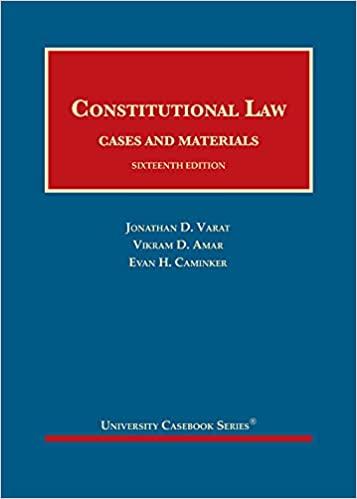Question
chapter 11 2 Critical Legal Thinking Case 11.5 Passage of Title J. A. Coghill owned a Rolls-Royce Corniche automobile, which he sold to a man
chapter 11 2
Critical Legal Thinking Case
11.5 Passage of Title J. A. Coghill owned a Rolls-Royce Corniche automobile, which he sold to a man claiming to be Daniel Bellman. Bellman gave Coghill a cashier's check for $94,500. When Coghill tried to cash the check, his bank informed him that the check had been forged. Coghill reported the vehicle as stolen. Subsequently, Barry Hyken responded to a newspaper ad listing a RollsRoyce Corniche for sale. Hyken went to meet the seller of the car, the man who claimed to be Bellman, in a parking lot. When Hyken asked why the car was advertised as a 1980 model when it was in fact a 1979, Bellman replied that it was a newspaper mistake. Hyken agreed to pay $62,000 for the car. When Hyken asked to see Bellman's identification, Bellman provided documents with two different addresses. Bellman explained that he was in the process of moving. Although there seemed to be some irregularities in the title documents to the car, Hyken took possession anyway. Three weeks later, the Rolls-Royce Corniche was seized by the police. Hyken sued to get it back. Who wins? Landshire Food Serv., Inc. v. Coghill, 709 S.W.2d 509 (Mo. Ct. App. 1986).
Schlageter III, John J.; Cheeseman, Henry R.; Reed, Kathleen. Contract Law for Paralegals (p. 303). Pearson Education. Kindle Edition.
Critical Legal Thinking Case
11.7 Risk of Loss All America Export-Import Corp. (All America) placed an order for several thousand pounds of yarn with A.M. Knitwear (Knitwear). On June 4, All America sent Knitwear a purchase order. The purchase order stated the terms of the sale, including language that stated the price was FOB the seller's plant. A truck hired by All America arrived at Knitwear's plant. Knitwear turned the yarn over to the carrier and notified All America that the goods were now on the truck. The truck left Knitwear's plant and proceeded to a local warehouse. Sometime during the night, the truck was hijacked and all the yarn was stolen. All America had paid for the yarn by check but stopped payment on it when it learned the goods had been stolen. Knitwear sued All America, claiming it must pay for the stolen goods because it bore the risk of loss. Who wins? A.M. Knitwear v. All Am., Etc., 359 N.E.2d (N.Y. 1976).
Schlageter III, John J.; Cheeseman, Henry R.; Reed, Kathleen. Contract Law for Paralegals (p. 304). Pearson Education. Kindle Edition.
Step by Step Solution
There are 3 Steps involved in it
Step: 1

Get Instant Access to Expert-Tailored Solutions
See step-by-step solutions with expert insights and AI powered tools for academic success
Step: 2

Step: 3

Ace Your Homework with AI
Get the answers you need in no time with our AI-driven, step-by-step assistance
Get Started


